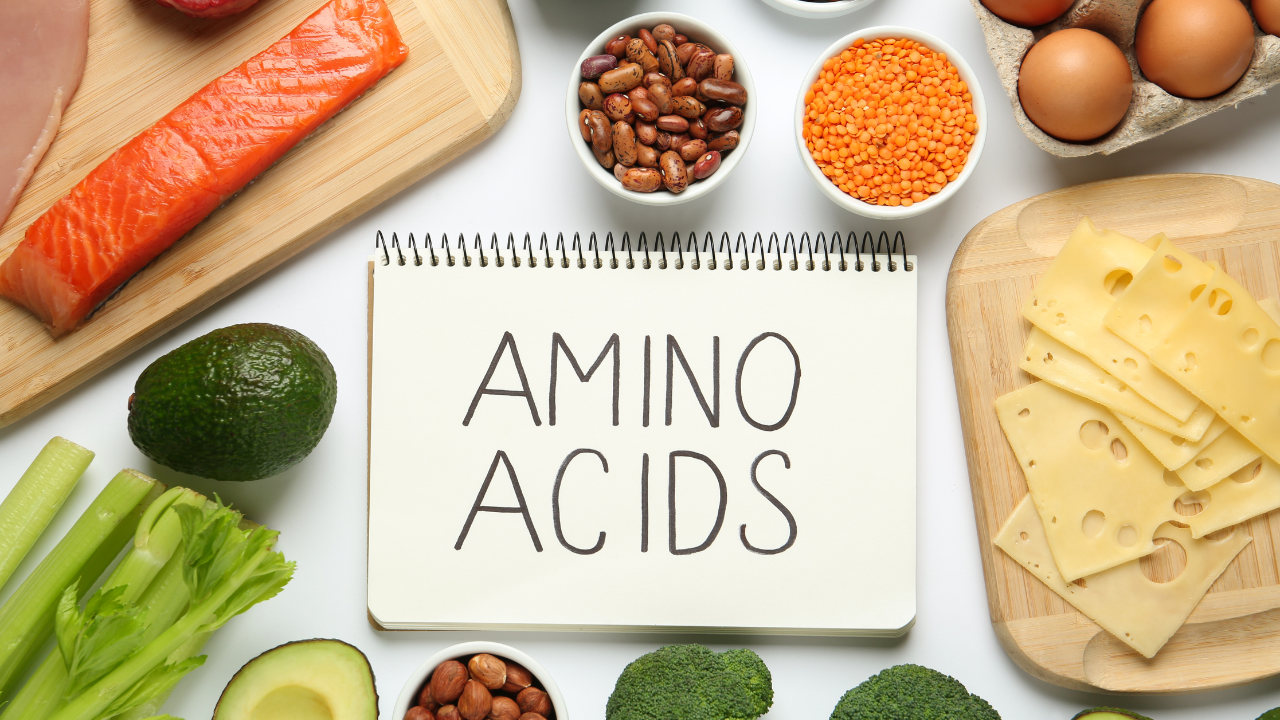Amazing power of Amino acids
Amazing power of Amino acids
Amino acids are essential components of proteins, crucial for growth, detoxification, immunity, and metabolism. There are 22 types of amino acids, each playing a specific role in the body’s functions. An imbalance can cause health issues.
What Are Amino Acids?

These compounds are necessary for life, as identified by Dutch scientist G.J. Mulder in 1838. Proteins, derived from the Greek word meaning “to take the first place,” must be broken down into amino acids to be absorbed by the body.
Types and Functions:
Proteins are divided into digestible and non-digestible types, each containing amino acids. The body needs about 22 amino acids for normal functioning, some of which must be obtained from the diet as essential amino acids.
Importance:
Amino acids are vital for tissue repair, detoxification, and overall maintenance. Deficiencies can lead to diseases, hormonal imbalances, and disrupted biological cycles.
Balancing Amino Acids:
Proper levels of amino acids are crucial for health, requiring a balanced diet to support the body’s needs. Understanding their roles and ensuring balanced intake is key to maintaining good health.
The Importance of Essential Amino Acids in Daily Nutrition

Essential amino acids play a critical role in the maintenance and growth of our bodies. The daily requirement for these amino acids is measured in milligrams per kilogram of body weight. These requirements vary significantly across different stages of life: infants, children, and adults.
Histidine is particularly important for infants as it supports growth. This amino acid is crucial during the early years but becomes less necessary after the age of 10-12 years. The requirement decreases as the body matures and eventually becomes minimal in adulthood.
For instance, the recommended daily intake of Isoleucine for infants is 80 milligrams, which reduces to 12 milligrams for adults. These values illustrate the changing needs of the body as it grows and matures.
Tryptophan is another essential amino acid necessary for blood clotting. Deficiency in tryptophan can lead to excessive bleeding from injuries because it supports the effectiveness of Vitamin K in blood clotting. Additionally, tryptophan is vital for the production of digestive juices, which are necessary for the proper digestion and absorption of nutrients.
Proper digestion and nutrient absorption are critical for converting food into essential amino acids. The deficiencies of vitamins B12 and D3, despite their abundance in certain regions, often result from poor digestion. For example, in countries with ample sunshine like India, vitamin D deficiencies are still prevalent, indicating that nutrient absorption rather than intake might be the issue.
Digestive health impacts the entire body’s nutrient levels. For the body to utilize the nutrients from food, it must first digest and absorb them properly. This process requires the presence of essential amino acids.
Essential amino acids also support the optic system and are crucial for the female reproductive system. Infertility issues, which have led to a rise in fertility clinics, can sometimes be addressed by ensuring a proper diet rich in essential amino acids. Ensuring these amino acids are present in the diet can help improve reproductive health and address related issues.
For those suffering from insomnia, essential amino acids like tryptophan can help improve sleep quality. Doctors often prescribe sleeping pills, but dietary adjustments to include tryptophan-rich foods can offer a natural alternative to improve sleep.
Maintaining Normal Body Weight with Essential Amino Acids

Maintaining a normal body weight can be challenging, even with proper diet, exercise, and sleep. Fluctuations in weight or difficulty in reducing weight might indicate a deficiency in essential amino acids, which play a crucial role in body weight regulation.
The Role of Essential Amino Acids:
Essential amino acids are vital for various bodily functions, including maintaining normal body weight. A deficiency in these amino acids can prevent weight normalisation according to your age and body type, leading to excessive fat retention and imbalanced lipid levels in the body.
Sources of Essential Amino Acids:
To avoid deficiencies, it is important to incorporate rich sources of essential amino acids into your diet. Some of the best sources include:
- Nuts: Brazil nuts, hazelnuts, walnuts, and almonds. These should be soaked for a minimum of four to five hours before consumption to aid digestion.
- Sprouts and Vegetables: Brussels sprouts, cabbage, and cauliflower.
- Fruits: Pineapple and apples.
- Grains and Seeds: Oats, buckwheat flour, and sunflower seeds.
- Dairy Products: If not lactose intolerant, dairy products can be beneficial.
- Non-Vegetarian Options: Red meat, eggs, and fish.
Consuming Nuts and Protein Sources:
Nuts are a rich source of digestible protein, but they should be soaked before consumption. The best time to consume soaked nuts is as a mid-morning or mid-afternoon snack, ideally three to four hours after lunch.
The Essential Amino Acids: Building Blocks of Health and Vitality

Amino acids, the building blocks of proteins, play critical roles in various bodily functions. Each amino acid has unique benefits, making them essential for overall health and well-being. This article explores the importance, sources, and health benefits of key amino acids: Lysine, Valine, Isoleucine, Leucine, Threonine, Histidine, Arginine, Cysteine, Tyrosine, and Glutamine.

1.Lysine
Importance:
- Inhibits viruses.
- Regulates the female reproductive cycle.
- Prevents headaches, dizziness, nausea, and anemia.
- Aids in the production of red blood cells and absorption of oxygen.
Rich Sources:
- Nuts and Seeds: Easily accessible and can be consumed regularly.
- Vegetables: Fresh and locally available seasonal and regional vegetables.
- Fruits: Avocado, mango, pears, and apricots.
- Non-Vegetarian Options: Red meat, Parmesan cheese, and cod liver fish.
2.Valine
Importance:
- Beneficial for skin health, preventing early wrinkles, dryness, and red patches.
- Supports memory gland function.
- Aids ovarian health.
- Maintains digestive system health.
- Regulates the nervous system, especially sensitivity to touch and sound.
- Deficiency: Can lead to sensitive skin and issues with temperature extremes.
Sources:
- Vegetarian: Almonds, vegetables, apples, whole grains, dairy products, peanuts, sesame seeds, lentils, kidney beans, and black beans.
- Non-Vegetarian: Meat, fish, and eggs.
3.Isoleucine & Leucine
Importance:
- Maintain nitrogen balance, vital for all body functions.
- Regulate the metabolism of key glands:
- Thymus gland
- Spleen
- Pituitary gland (controls overall body function)
Sources:
- Nuts: Walnuts, pistachios, almonds, hazelnuts (excluding cashew nuts).
- Other Sources: Olives, sunflower seeds, avocado, spirulina, beans, legumes, dairy products, meat, fish, and eggs.
4.Threonine
Importance:
- Essential for adrenaline production, stress response, and energy regulation.
- Supports weight management by aiding efficient kidney and bladder function.
- Critical for child development.
- Deficiency: Can lead to developmental issues, breathing difficulties, jaundice, abnormal growth, slow learning, and growth in children.
- Possesses anti-convulsive properties protecting against body tremors and rapid heartbeats.
Sources:
- Abundant in mother’s milk.
- Other Sources: Nuts and seeds, parsley, tomatoes, lentils, milk, cottage cheese, and fish (especially salmon).
5.Histidine
Importance:
- Vital for tissue growth and repair.
- Essential for glycogen formation.
- Helps manage rheumatoid arthritis and liver issues.
- Deficiency: Can lead to complications in those with autoimmune disorders and liver diseases.
Sources:
- Vegetables: Beetroot, carrot, radish, and potatoes.
- Other Sources: Rice, buckwheat flour, quinoa, and fish.
Consumption Tips:
- Prefer consuming histidine-rich foods before sunset to aid digestion and nutrient absorption.
6.Arginine
Importance:
- Essential for male reproductive health, supporting sperm and testosterone production.
- Crucial for both male and female reproductive health.
- Deficiency: Can contribute to male infertility by affecting sperm quality and quantity.
Sources:
- Seeds: Cooked pumpkin seeds, watermelon seeds, sesame seeds, and sunflower seeds (roasting recommended).
- Dairy: Milk, yogurt, and cheese.
- Recommended Intake: Two to three tablespoons of seeds per day.
7.Cysteine
Importance:
- Boosts immunity by enhancing white blood cell activity.
- Protects against oxidative damage, aiding in cancer prevention and anti-aging.
- Supports faster recovery from surgeries.
- Deficiency: Can lead to weakened immune response and increased oxidative stress.
Sources:
- Dairy: Cottage cheese, yogurt.
- Other Sources: Oat flakes, wheat grass, meat, chicken, whole grains, almonds, pistachios, and eggs.
- Usage: Fresh wheat grass juice (40 grams) or its powder/tablets for post-surgery recovery.
8.Tyrosine
Importance:
- Manages stress and mood swings.
- Supports brain function, alleviating symptoms of depression, nervousness, and irritability.
- Helps with allergies and improves overall mental health.
- Deficiency: Can lead to increased stress, mood disorders, and reduced brain function.
Sources:
- Foods: Peanuts, almonds, avocado, banana, dairy products, turkey, fish, pumpkin seeds, and sesame seeds.
9.Glutamine
Importance:
- Known as the sobriety nutrient, helps in addiction recovery by reducing cravings for alcohol, tobacco, and drugs.
- Supports general health and immune function.
- Deficiency: Can hinder recovery from addiction and weaken the immune system.
Sources:
- Foods: Dairy, eggs, beetroot, cabbage, peanuts, parsley, coriander, carrots, wheat, papaya, celery, and fermented foods.
Understanding Amino Acid Deficiencies and Testing

When it comes to diagnosing amino acid deficiencies, it’s important to note that continuous blood tests are generally not necessary. Deficiencies are often identified through symptoms that appear over time. However, if a specific test is needed to confirm a deficiency, the plasma amino acid blood test,the VitaL test, can be utilized. This test is typically prescribed by hematologists or from an allopathic perspective, often requiring a prescription.
The plasma amino acid blood test is a useful tool for identifying deficiencies and imbalances. Although it can provide valuable information, it is estimated that only 5% to 10% of cases will require such testing. In most instances, symptoms alone are sufficient for diagnosing and addressing the issue.
Food sources of amino acids are quite common, which means that with proper evaluation of symptoms, you can often determine and address deficiencies through dietary recommendations. By relying on your experience and understanding of common symptoms, you can suggest appropriate foods to help patients recover from their deficiencies and improve their overall health.
Amino acids play a crucial role in the body alongside other nutrients and electrolytes. Understanding amino acids and their functions is essential for effective health management.








